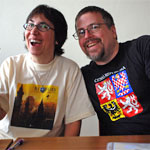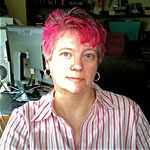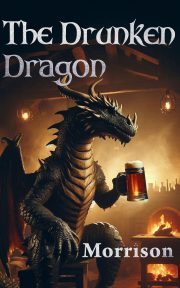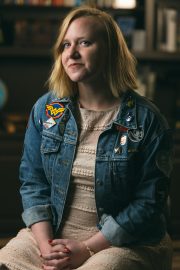The Weird World of the VanderMeers: Part II
by Cat Rambo
 This is part two of an interview with Hugo Award winner Ann VanderMeer and World Fantasy Award winner Jeff VanderMeer. Part I is here.
This is part two of an interview with Hugo Award winner Ann VanderMeer and World Fantasy Award winner Jeff VanderMeer. Part I is here.
What are your ideal working conditions? What were the worst ones you ever faced?
ANN: To be honest, I’d say that working on the Thackery T. Lambshead Cabinet of Curiosities was about as close to ideal as I’ve ever seen. We had a great working relationship with our editor, Diana Gill, and all the good people at HarperCollins. She embraced our dreams for this book and helped us make them reality. We also had the opportunity to work with some of the most talented people in the field today.
JEFF: The worst conditions we ever faced occurred on the forthcoming The Weird, through nobody’s fault but scope and circumstance. Initially it was slotted for November of 2010 and the project was pitched to us in February of 2010. This meant we had about four months to complete the project. It was a great opportunity so we said yes, but basically we put our lives on hold for that period. I gained about fifteen pounds just from the stress and inactivity, something I’m just now recovering from. Even as familiar with weird fiction as we are, to get 750,000 words you have to read something like three or four million, so you can narrow it down, do research, buy books, and then in not much longer than the four months acquire world-wide English-language rights to 120 stories for print and e-book. We did it, something we don’t believe any editor in the history of the field has ever accomplished before for this complex and length an antho… but then for perfectly good reasons the publisher delayed publication by a year. This helped us to some extent in adding a few stories and acquiring rights, but psychologically it was a little damaging, especially since we were in the middle of teaching Clarion when we found out.
ANN: Jeff forgets that while we were in the midst of this massive all-consuming project we also delivered Steampunk Reloaded, The Third Bear, and Monstrous Creatures, plus The Kosher Guide to Imaginary Animals was released. For four months I didn’t see my grandson before he moved back to Amsterdam–I will never let something like that happen again.
JEFF: The truth is working on an anthology is like an obsession to me, and the more difficult the execution of the idea or focus, the more I become locked in on it to the exclusion of all else. This is good on one level and fairly scarring on others. I don’t necessarily recommend it as an approach, but it does teach you a lot. Researching The Weird has made me a much better fiction writer.
What would your ideal, unlimited budget project look like?
ANN: Unlimited budget? I’d really love to do more original fiction anthologies. I like combining established writers with new ones. I also like highly visual projects where we can mix art and fiction.
JEFF: A couple of 100-year, 750,000-word anthologies covering, respectively, world fantasy and surrealism. An anthology of contemporary non-realistic fiction in translation would be nice–but only if it had a good-sized budget. One thing anthologists don’t talk about much is that you can actually lose money compiling an anthology if you’re not careful.
E-publishing is changing the shape of books and publishing right now, faster than most people expected. What trends do you see shaping the writing and publishing industry over the next decade?
ANN: Even as e-books take us by storm, people will still want to hold a physical book in their hands, so I don’t think that will go away. I do think, however, that the industry will develop a standard format that any reader, computer, etc., can read. Having multiple formats just won’t make sense in the future.
JEFF: I think niche authors and publishers have a chance to flourish in this environment and reach the widest possible audience for their work. I also think that in terms of print books fiction anthologies like our Thackery T. Lambshead Cabinet of Curiosities may become the norm: hybrids of text and image that look fine on an e-book reader but that cry out for the full tactile experience when reading them. In a sense, coffee table books of fiction.
You’ve done plenty of teaching as a team. What words of wisdom would you tattoo on the foreheads of your students, so they’d never forget them?
ANN: Believe in yourself and keep writing (and keep reading, read everything especially outside of your genre). Your stories are not your babies and they are not you, so if a story is rejected, it’s not personal. Keep writing….
JEFF: I’ll play bad cop for a second. There’s sometimes a kind of odd must-have-now syndrome where if a beginning writer doesn’t get published right away, doesn’t have a story collection out there right away…well, that’s just totally unfair. Waaaa. There are a lot of things we try to convey, but one important thing is that the world doesn’t care if you write or not, and the world especially doesn’t care if you become a published writer with a career. And if you don’t consistently write and submit your work, you won’t have a career. It’s that simple. And sometimes it can take a decade or more to gain a foothold. And writing good fiction is hard, and takes practice. We all enter the field with different advantages and disadvantages. Use what you have and don’t let the rest affect you as much as possible. Again, it’s not a fair world and never will be, so don’t talk yourself out of doing things just because the world doesn’t give two craps. This is actually a very positive and energizing message when delivered in the context of your belief in their writing. “Nothing worth doing is easy” is a generalization but a useful one.
Sometimes, too, students come to workshops with an idea of what they should write based either on trends or what other people have told them they should write, rather than what’s personal to them or of interest to them. We make it clear that we value what makes them unique–that we are there merely to bring out and help them hone that uniqueness. No writer should be asked to give up what makes them unique. Sometimes being yourself means success takes a little longer, but it’s so much more satisfying when you do it on your own terms. At the end of the day, you have to enjoy what you do and you have to be proud of it. Don’t sell yourself short, either–failing bigger and better always gets you closer to something better.
ANN: Jeff – I don’t think that will fit on someone’s forehead!
JEFF: “Don’t lift a pebble and proclaim that you’re a body-builder”?
How do you maintain your high productivity levels? How do you prioritize projects?
ANN: Our kids are grown and gone and they all live far away so we no longer have those daily responsibilities. And we enjoy the work that we do, so it doesn’t “feel” like work (most of the time). As for the priorities? It’s important to us to have several things going on at once. It allows us to flex different muscles throughout the week. I have a large calendar on our fridge. All our commitments are placed on this board so that we can see the entire year (and the next one). This shows us what’s possible.
JEFF: A combination of discipline and knowing what components go into a project and roughly how many hours each will take. We also acknowledge that we can’t keep up the pace without taking time off for fun and relaxation. Doing lots of different kinds of projects is good, too, to avoid burn-out. Generally, too, we juxtapose higher and lower paying gigs. For example, we can’t do two charity anthologies at the same time or we’d risk our financial security.
What are some of your guilty pleasures?
ANN: Talking cat videos (or funny cat videos in general). I just can’t seem to get enough of them!
JEFF: I don’t know if they’re guilty pleasures or not, but we like to play pool, to hike, to watch bad movies that are funny. A lot of HBO series. And I love just about all forms of noir fiction, good and bad. Currently hooked on the TV show House.
In Part III, Ann and Jeff conclude with a discussion of their influences, their philosophies of editing, and what they read for pleasure.
Hugo Award winner Ann VanderMeer and World Fantasy Award winner Jeff VanderMeer have recently co-edited such anthologies as Best American Fantasy #1 & 2, Steampunk, Steampunk Reloaded, The New Weird, Last Drink Bird Head, Fast Ships, Black Sails, and The Thackery T. Lambshead Cabinet of Curiosities. They are the co-authors of The Kosher Guide to Imaginary Animals. Future projects include The Weird: A Compendium of Strange and Dark Fictions for Atlantic and two indie anthologies ODD? (Is it Odd Or Are You Too Normal?) and BESTIARY. Jeff’s latest books are the novel Finch, the story collection The Third Bear, and the coffee table book The Steampunk Bible (with S.J. Chambers. Ann is the editor-in-chief of Weird Tales magazine and has a regular art column on the popular SF/fantasy website io9. Together, they have been profiled by National Public Radio and the NewYork Times’ Papercuts blog. They are active teachers, and have taught at Clarion San Diego, Odyssey, and the teen writing camp Shared Worlds, for which Jeff serves as the assistant director. Speaking engagements have included MIT, the Library of Congress, and World of Warcraft. They live in Tallahassee, Florida, with too many books. For more information, visit www.jeffvandermeer.com.
•••
 Find Cat Rambo’s fiction at her website. She teaches at Bellevue College, acts as a board member for Broad Universe and serves as a volunteer with Clarion West. Her most recent publication is her short story collection for Kindle and other e-readers. Look for upcoming work in 2011 in Abyss & Apex, Beneath Ceaseless Skies, Bull Spec, Daily Science Fiction, Giganotasaurus, Lightspeed, and more.
Find Cat Rambo’s fiction at her website. She teaches at Bellevue College, acts as a board member for Broad Universe and serves as a volunteer with Clarion West. Her most recent publication is her short story collection for Kindle and other e-readers. Look for upcoming work in 2011 in Abyss & Apex, Beneath Ceaseless Skies, Bull Spec, Daily Science Fiction, Giganotasaurus, Lightspeed, and more.


